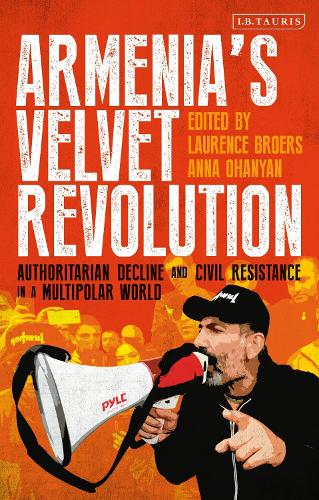
Armenias Velvet Revolution: Authoritarian Decline and Civil Resistance in a Multipolar World
(Paperback)
Available Formats
Publishing Details
Armenias Velvet Revolution: Authoritarian Decline and Civil Resistance in a Multipolar World
By (Author) Anna Ohanyan
Edited by Laurence Broers
Bloomsbury Publishing PLC
I.B. Tauris
3rd September 2020
United Kingdom
Classifications
Tertiary Education
Non Fiction
947.56086
Physical Properties
Paperback
288
Width 138mm, Height 214mm, Spine 16mm
360g
Description
In April 2018, Armenia experienced a remarkable popular uprising leading to the resignation of Prime Minister Serzh Sargsyan and his replacement by protest leader Nikol Pashinyan. Evoking Czechoslovakias similarly peaceful overthrow of communism 30 years previously, the uprising came to be known as Armenias Velvet Revolution: a broad-based movement calling for clean government, democracy and economic reform. This volume examines how a popular protest movement, showcasing civil disobedience as a mass strategy for the first time in the post-Soviet space, overcame these unpromising circumstances. Situating the events in Armenia in their national, regional and global contexts, different contributions evaluate the causes driving Armenias unexpected democratic turn, the reasons for regime vulnerability and the factors mediating a non-violent outcome. Drawing on comparative perspectives with democratic transitions across the world, this book will be essential reading for those interested in the regime dynamics, social movements and contested politics of contemporary Eurasia, as well as policy-makers and practitioners in the fields of democracy assistance and human rights in an increasingly multipolar world.
Reviews
In a time when democracies are in decline and authoritarian populism spreads its illiberal shadow from Erdogans Turkey to Modis India to Trumps America, a light from Armenia pierces the growing political darkness. Begun as a march on the capital and legitimized in free and fair elections, a non-violent, democratic, civilly disobedient movement took power in Yerevan and carried out a determined cleansing of an arrogant and corrupt power structure. While the evident decay of democracy across the globe speaks to the fragility of liberalism, this excellent volume demonstrates that authoritarian regimes have deep-seated weaknesses that can undermine the dominion of venal elites and unleash aspiring democratic forces. The post-Soviet Armenian state, alone in a dangerous neighborhood, at war with one neighbor and threatened by another, substituted security for freedom. Yet a courageous and resistant civil society never fully succumbed to the usurpation of the promise of progress. As the authors within and outside Armenia eloquently elaborate in this collection, non-violent resistance can lead effectively toward a democratic outcome * Ronald Grigor Suny, WILLIAM H. SEWELL JR. DISTINGUISHED UNIVERSITY PROFESSOR OF HISTORY *
This is the definitive history of Armenias Velvet Revolution. The volume provides context, analysis, and nuance regarding Armenias impressive show of people power in 2018, and prospects for longer-term transformation. Kudos to the editors and authors of this masterful collection. * Erica Chenoweth, Harvard University, USA *
Author Bio
Anna Ohanyan is a Fulbright Scholar (2012-13) and the Richard B. Finnegan Distinguished Professor of Political Science and International Relations at Stonehill College in Massachusetts. She is the author of Networked Regionalism as Conflict Management (Stanford University Press, 2015) and editor of Russia Abroad: Driving Regional Fracture in Post-Communist Eurasia and Beyond (Georgetown University Press, 2018). Professor Ohanyan has published widely on global governance, security studies and conflict management in scholarly and policy journals, and has consulted for the UN Foundation, World Bank, National Intelligence Council Project at Maryland University, the US Department of State, the Carter Center, and USAID. Laurence Broers is a research associate at SOAS in London, and an associate fellow at the Royal Institute for International Affairs at Chatham House. He has a decades experience as a practitioner of peacebuilding and human rights advocacy in the South Caucasus, and his research interests include intractable conflicts and peacebuilding in post-Soviet Eurasia, the politics of unrecognised states, and the critical geopolitics of post-Soviet space. He is the author of Armenia and Azerbaijan: Anatomy of a Rivalry (Edinburgh University Press, forthcoming) and the co-editor of The Unrecognised Politics of De Facto States in the Post-Soviet Space (Caucasus Institute, 2015) and Networked Insurgencies and Foreign Fighters in Eurasia (Routledge, 2018). He is also co-founder and chief editor of the triannual journal Caucasus Survey.
